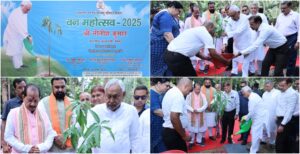
Bihar hosts global food trade summit to boost agri exports and rural economy
Patna: Patna has played host to a major international trade summit aimed at boosting Bihar’s agricultural exports and positioning the state as a reliable global sourcing hub. The Bihar International Buyer-Seller Meet (IBSM), held on 19 and May 20 2025, brought together stakeholders from over 20 countries, highlighting the region’s vast agri-food potential.
The event, organised by the Ministry of Food Processing Industries in collaboration with APEDA, the Trade Promotion Council of India (TPCI), and the Government of Bihar, drew 70 international buyers—including representatives from six global retail chains—alongside 50 domestic and 20 institutional buyers.
Inaugurated by Chirag Paswan, Union Minister for Food Processing Industries, the event also saw the participation of Bihar Deputy Chief Minister Vijay Kumar Sinha, Industries Minister Nitish Mishra, and other senior officials from central and state departments.
Over 400 B2B meetings took place during the two-day event, creating new market opportunities for local MSMEs and farmer-producer organisations (FPOs). Global firms such as LuLu Group (UAE), SARTAJ (Japan), Datar & Sons (UAE) and Global Foods Trading (Germany) expressed strong interest in sourcing rice, spices, makhana, and fruits from Bihar. Companies like Royal Golden Trading (UAE) and UVR Natural Foods (India) announced concrete sourcing plans—an important step towards establishing Bihar as a trusted agri-export destination.
Opening the session, Abhishek Dev, President of APEDA, described IBSM as the outcome of institutional efforts to expand market access for India’s agricultural producers. He also introduced the new Tracenet 2.0 traceability platform, which will support the export of GI-tagged and organic products.
Senior officials including Mihir Kumar Singh, Additional Chief Secretary, Industries Department, Bihar, and Minhaj Alam, Additional Secretary, MoFPI, underscored the importance of scaling up food processing to drive employment and attract investment.
In his keynote address, Nitish Mishra said Bihar could become the “growth engine of eastern India” and invited investors to leverage the state’s industrial infrastructure, highlighting initiatives such as the Mega Food Park in Muzaffarpur, expedited land allotments within seven days, and a single-window clearance system.
Deputy Chief Minister Vijay Kumar Sinha called the food processing sector the “best medium to double farmers’ incomes”, while Union Minister Chirag Paswan framed the event as a “transformational step for rural prosperity,” aligning with the government’s Developed India @2047 vision.
Paswan stressed the importance of empowering Bihar’s youth to become job creators and pledged full government support to investors. He also reflected on Bihar’s civilisational legacy—citing Aryabhatta, Chanakya, and Sita Mata—and its renewed role in national progress. “Bihar’s fertile land and entrepreneurial spirit,” he said, “will help make India a global food basket.”
Highlighting Bihar’s leadership under the PMFME scheme, Paswan shared that 10,270 loans worth ₹624.42 crore were sanctioned in the state in FY 2024–25—the highest in the country. He also announced the upcoming NIFTEM Institute in Bihar, envisioned as a centre for food technology innovation.
The Minister launched a strategic report titled “Strategies to Boost India’s Makhana Exports”, positioning Bihar as a key player in the sector. Notably, 12 companies committed to sourcing rice, pulses, spices, fruits, vegetables and makhana from the state.
The event concluded with a vote of thanks by the TPCI Chairman, who praised the joint efforts of the central and state governments. The IBSM has been widely hailed as a milestone in Bihar’s journey towards becoming a national leader in agri-exports and food processing.





